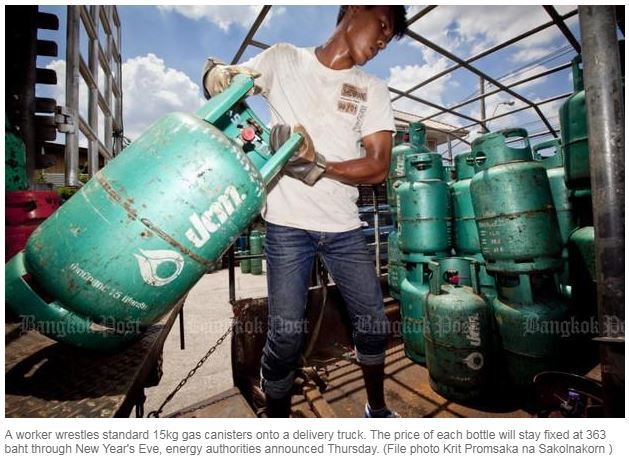Thailand: Epac sticking with LPG price limit until 2019
Energy policymakers are maintaining the cap on cooking gas prices at 13.08 baht per kilogramme, equal to 363 baht per 15kg cylinder, until the end of the year.
Thursday’s meeting of the Energy Policy Administration Committee (Epac) approved the resolution despite Saudi Arabia’s reference price rising by 4.5% to US$587 a tonne in August from $562.50 in July.
Twarath Sutabutr, secretary-general of the Energy Policy and Planning Office (Eppo), said cooking gas prices are being subsidised by oil consumers because the state Oil Fund’s cooking gas account has been depleted.
Epac also approved borrowing cash from the oil user account for the cooking gas account in order to maintain the price at 363 baht.
The budget for this cross-subsidy is expected to be 3 billion baht to cap cooking gas prices for the remainder of the year.
The cross-subsidy programme was previously terminated in 2014 after a decade, due to the massive debt that was accrued by the cooking gas account. In 2007, the debt was 93 billion baht.
Cooking gas, also known as liquefied petroleum gas (LPG), is a commodity and has been a hot-button political issue over the last two decades as politicians attempted to keep prices low to placate the masses.
Global oil prices collapsed during 2014-16 to below $50 per barrel, making the subsidy unnecessary.
According to the Eppo website, the cooking gas account was 117 million baht in debt on July 15, a result of subsidising cooking gas prices at 6.23 baht per kg. Cash in the oil user account stood at 29.6 billion baht.
But Epac has yet to consider implementing licences for small power producers (SPPs), which are gradually expiring, disappointing many investors.
Chote Chusuwan, director and secretary for the Association of Private Power Producers, said private investors need a clear-cut policy on SPP licence expiry.
Although the National Energy Policy Council (NEPC) already approved licence renewals in May 2016, implementing the renewal has yet to be done by the NEPC.
Mr Chote said the more the SPP policy is prolonged, the more damage investors have to handle because several overseas investors have been awaiting a final decision, and Mr Chote said the more the SPP policy is prolonged, the more damage investors have to handle because several overseas investors have been awaiting a final decision, and
“25 SPP operator licences are scheduled to expire during 2017-25, and they have a combined capacity of almost 2,000 megawatts,” Mr Chote said. “All of them have yet to solidify power purchase contracts with clients because of uncertainty regarding whether existing power plants can operate.”
He said the implementation of NEPC approval is crucial to driving the country’s economy because most SPP customers are in industrial estates.
According to the NEPC approval in May 2016, the licence renewals will grant SPPs a further 20 years to operate and allow them to sell electricity to state-run power utility Electricity Generating Authority of Thailand (Egat) at 30MW per power plant, a reduction from the previous licence allowance of 90MW.
Egat is the national power monopoly and a single power buyer.
Source: https://www.bangkokpost.com/business/news/1518902/epac-sticking-with-lpg-price-limit-until-2019


 English
English




